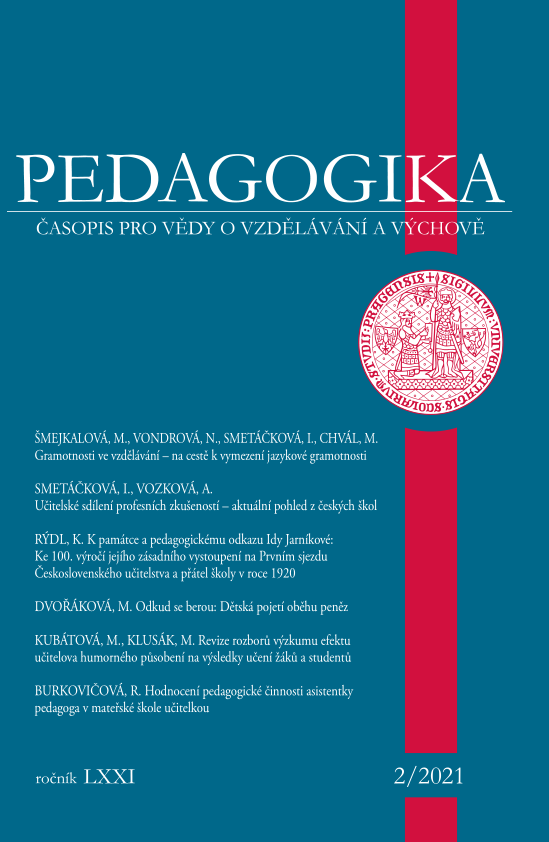Children’s Understanding Economic Relations
DOI:
https://doi.org/10.14712/23362189.2020.1850Keywords:
children’s understanding, conceptual change, semi-structured interview, primary education, circulation of money, fi nancial literacyAbstract
The study introduces the issue of the development of childrenʼs understanding of economic relations in the period of primary education. In-depth interviews focused on ways of raising money for the familyʼs livelihood investigate childrenʼs justifications for different income levels and, more generally, the concept of the circulation of money. It compares the results with similarly focused foreign research from the last 30 years.
Goals: The concepts of partial phenomena of economic life that were identified indicate tendencies in the thinking of primary school pupils and offer starting points for the teaching of primary social science.
Method: Data from semi-structured interviews was processed. The transcripts of the interviews were coded and the childrenʼs concepts were subsequently categorised according to the degree of their complexity and the compatibility of partial ideas.
Results: In both parts of the research, childrenʼs concepts show a tendency to apply their own social experience to the economic sphere. Domain-specific concepts referring to the idea of the labour market or the circulation of money in society were connected to the pupilʼs experience with the employment of parents or to other specific examples more than the development period.
Conclusion: The views of the labour market and the circulation of money that were elicited can contribute to the didactics of social sciences as a starting point for the process of conceptual change. The results offer variants of incomplete views and misconceptions and provide stimuli for the initiation of conceptual change in teaching.
References
Barrett, M., & Buchanan-Barrow, E. (2004). Children's understanding of society. Hove: Psychology Press.
https://doi.org/10.4324/9780203463567
Bastounis, M., Leiser, D., & Roland-Levy, C. (2004). Psychosocial variables involved in the construction of lay thinking about the economy: Results of a cross-national survey. Journal of Economic Psychology, 25, 263-278.
https://doi.org/10.1016/S0167-4870(02)00198-8
Berti, A. E. (2002). Children's understanding of society: Psychological studies and their educational implications. In E. Nasman & A. Ross (Eds.), Children's understanding in the new Europe (s. 89-107). Trentham Books.
Berti, A. E., Bombi, A. S., & Duveen, G. T. (1988). The child's construction of economics. Cambridge: Cambridge University Press.
Bonn, M., & Webley, P. (2000). South African children's understanding of money and banking. British Journal of Developmental Psychology, 18(2), 269-278.
https://doi.org/10.1348/026151000165689
Brophy, J., Alleman, J., & Halvorsen, A. (2018). Powerful social studies for elementary students. 4. vyd. Belmont, CA: Cengage.
Carey, S. (1988). Conceptual differences between children and adults. Mind & Langugage, 3(3), 167-181.
https://doi.org/10.1111/j.1468-0017.1988.tb00141.x
Clement, J. (2000). Analysis of clinical interviews: Foundations and model viability. In R. Lesh & A. Kelly (Eds.), Handbook of research methodologies for science and mathematics education (s. 341-385). Hillsdale: Lawrence Erlbaum.
Davies, P. (2019). The construction of frameworks in learners' thinking: Conceptual change and threshold concepts in economics. International Review of Economics Education, 30, 100-135.
https://doi.org/10.1016/j.iree.2018.05.002
di Sessa, A. A. (2013). A bird's-eye view of the "Pieces" vs "Coherence" controversy. In S. Vosniadou (Ed.), International handbook of research on conceptual change (s. 31-49). New York: Routledge.
Doulík, P. (2005). Geneze dětských pojetí vybraných fenoménů. Ústí nad Labem: Univerzita J. E. Purkyně.
Hesová, A. et al. (2014). Katalog materiálů pro rozvoj finanční gramotnosti. Praha: Národní ústav pro vzdělávání. Dostupné z http://clanky.rvp.cz
Hradil, D. (2012). Shrnutí hlavních výstupů z měření finanční gramotnosti obyvatel ČR pro MF a ČNB. Dostupné z www.mfcr.cz
Hutchings, M. (2002). Toward an antidevelopmental view of children's social and economic inderstanding. In E. Nasman & A. Ross (Eds.), Children's understanding in the new Europe (s. 32-60). Trentham Books.
Chi, M. T. H. (2008). Three types of conceptual change: Belief revision, mental model transformation, and categorical shift. In S. Vosniadou (Ed.), International handbook of research on conceptual change (s. 61-82). New York: Routledge.
Chi, M. T. H. (2013). Two kinds and four sub-types of misconceived knowledge, ways to change it, and learning outcomes. In S. Vosniadou (Ed.), International handbook of research on conceptual change (s. 49-71). New York: Routledge.
Jahoda, G. (1983). European "lag" in the development of an economic concept: A study in Zimbabwe. British Journal of Developmental Psychology, 1, 113-120.
https://doi.org/10.1111/j.2044-835X.1983.tb00549.x
Janík, T. et al. (2007). Pedagogical content knowledge nebo didaktická znalost obsahu? Brno: Paido.
Jelemenska, P., Sander, E., & Kattmann, U. (2003). Model didaktickej rekonštrukcie: Impulz pre výskum v oborových didaktikách. Pedagogika, 53(2), 190-201.
Klínský, P., & Chromá, D. (2009). Finanční gramotnost: úlohy a metodika. Praha: Národní ústav odborného vzdělávání.
Leiser, D., & Drori, S. (2005). Naive understanding of inflation. The Journal of Socio-Economics, 34, 179-198.
https://doi.org/10.1016/j.socec.2004.09.006
Leiser, D., & Halachmi, R. B. (2006). Children's understanding of market forces. Journal of Economic Psychology, 27(1), 6-19.
https://doi.org/10.1016/j.joep.2005.06.008
Leiser, D., Seven, G., & Daphna, L. (1990). Children's economic socialization: summarizing the cross-cultural comparison of ten countries. Journal of Economic Psychology, 11, 591-614.
https://doi.org/10.1016/0167-4870(90)90038-B
Marton, F., & Pang, M. F. (2008). The idea of phenomenography and the pedagogy of conceptual change. In S. Vosniadou (Ed.), International handbook of research on conceptual change (s. 533-559). New York: Routledge.
Özdemir, G., & Clark, D. B. (2007). An overview of conceptual change theories. Eurasia Journal of Mathematics, Science and Technology Education, 3(4), 351-361.
https://doi.org/10.12973/ejmste/75414
Parsons, R., & Mamo, M. (2017). The source and impact of student preconceptions in economics principles classes. International Review of Economics Education, 25, 15-24.
https://doi.org/10.1016/j.iree.2017.04.001
Siegler, R. S., & Thompson, D. R. (1998). Hey, would you like a nice cold cup of lemonade on this day? Children's understanding of economic causation. Developmental Psychology, 34(1), 146-160.
https://doi.org/10.1037/0012-1649.34.1.146
PMid:9471012
Škoda, J. (2005). Současné trendy v přírodovědném vzděláváni. Ústí nad Labem: Univerzita J. E. Purkyně.
Vosniadou, S. (Ed.). (2008). International handbook of research on conceptual change. New York: Routledge.
https://doi.org/10.4324/9780203874813
Vosniadou, S. (Ed.). (2013). International handbook of research on conceptual change. 2. vyd. New York: Routledge.
https://doi.org/10.4324/9780203154472
Vyskočilová, E., & Morgado, L. (2000). Rozumí české děti ekonomickým pojmům a vztahům podobně jako portugalské děti? Československá psychologie, 44(6), 528-537.
Webley, P. (2004). Children's understanding of economics. In M. Barrett & E. Buchanan-Barrow (Eds.), Children's understanding of society (s. 43-67). Hove: Psychology Press.



